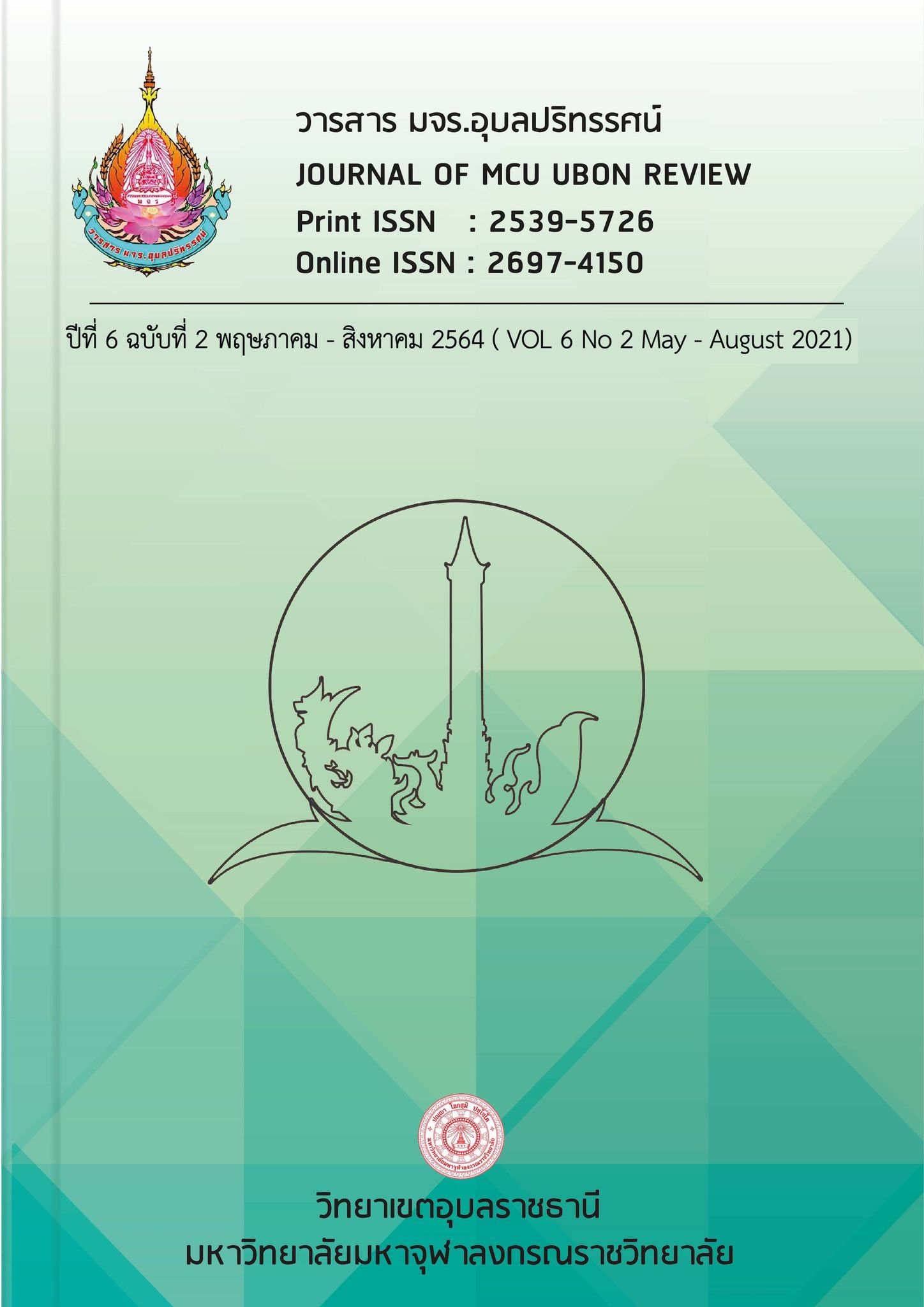DEVELOPMENT OF MORAL AND ETHICAL INDICATOR FOR PRIVATE EDUCATIONAL INSTITUTION ADMINISTRATORS IN BANGKOK PROVINCE
Main Article Content
Abstract
The Development of the Moral and Ethical Indicators for the Administrators of a Private Vocational Institutions of Bangkok aims: 1) to study the moral and ethical indicators for administrators of a private vocational institutions of Bangkok; 2) to examine the quality and prioritize the moral and ethical indicators for the administrators of a private vocational institutions in Bangkok; 3) to develop and assess the moral and ethical indicators for the administrators of a private vocational institutions of Bangkok. The researcher uses the mixed methods research: 1) the quantitative research uses questionnaires to collect data from the sample groups with 400 peoples; the statistical data analysis is a descriptive statistics. 2) The qualitative research collects data from the focus group,. The total number of participants is 11 persons. The results can be found that; 1) The moral and ethical indicators for the administrators of a private vocational institutions were comprised with 15 indicators: 1) a benevolence, 2) a justice, 3) an honesty, 4) a good friends, 5) a good governance, 6) a rationality, 7) a leadership, 8) a discipline, 9) a responsibility, 10) clear goals, visions, and missions, 11) a participated with a moral and ethical support, 12) a compliance with a professional code of conduct, 13) an efficient and effective administration, 14) a sacrifice, 15) a public mind. 2) the Factors affecting a moral and ethical indicator for the administrators of a private vocational institutions are, at the most agreement level, with a mean score of 4.67 and a standard deviation of 0.16. The highest aspect is a self-directed, followed by an organization/social aspect, while the last one is other people. 3) For quality inspection and prioritization of a moral and ethical indicators for administrators of private a vocational institution in Bangkok, the results can be found by the descending order as: 1) a justice, 2) a participated with a moral and ethical support, 3) a good friend, 4) a compliance with a professional code of conduct, 5) clear goals, visions, and missions, 6) a sacrifice, 7) a responsibility, 8) an efficient and effective administration, 9) a rationality, 10) a public mind, 11) an honesty, 12) a benevolence, 13) a discipline, 14) a good governance, and 15) a leadership.
Article Details
References
ผู้บริหารที่ส่งผลต่อประสิทธิภาพของการบริหารจัดการศึกษา โรงเรียนเอกชนจังหวัดนครปฐม,วารสารการบริหารการศึกษา มหาวิทยาลัยศิลปากร,ปีที่ 2 ฉบับที่ 2 (มกราคม-มิถุนายน), 98-108.
แก้วขวัญ ตั้งติพงศ์กูล.(2555). วิกฤตแรงงานไทย.คอลัมน์เศรษฐธรรมศาสตร์ตลาดวิชา. www.econ.tu.ac.th/oldweb/doc/news/409/econ_64_Kaewkwan. (5 มกราคม 2558)
คณะกรรมการส่งเสริมคุณธรรมแห่งชาติ (2560) คู่มือการขับเคลื่อนแผนแม่บทส่งเสริมคุณธรรมแห่งชาติ ฉบับที่ 1 (พ.ศ.2559-2564).
ชลินธร บุตรดีวงค์และนพดล เจนอักษร (2561) ความเป็นกัลยาณมิตรของผู้บริหารกับ
ความผูกพันต่อองค์กรของครูในโรงเรียน สังกัดสำนักงานเขตพื้นที่การศึกษาประถมศึกษามุกดาหาร, วารสารการบริหารการศึกษา มหาวิทยาลัยศิลปากร,ปีที่ 9 ฉบับที่ 1 (กรกฏาคม-กันยายน), 115-124.
ประทีป ทับโทน, ศักดา สถาพรวจนาและอรสา จรูญธรรม (2563) กลยุทธ์การบริหาร
สถานศึกษาด้วยความรับผิดชอบต่อสังคม ของสถานศึกษาสังกัดเทศบาล, วารสาร
วไลยอลงกรณ์ปริทัศน์ (มนุษยศาสตร์และสังคมศาสตร์) ปีที่10 ฉบับที่1 มกราคม-เมษายน, 27-40.
ภัทรพงษ์ ธำมรงค์ปรีชาชัย,ธีรวรรณ ธีระพงษ์และวีรวรรณ วงศ์ปิ่นเพ็ชร์ (2563) อิทธิพลของ
ความเมตตากรุณาต่อตนเองที่มีต่อความกรุณาต่อผู้อื่นและความสุขของจิตอาสา ในกรุงเทพมหานครและเขตปริมณฑล,วารสารมนุษยศาสตร์สาร มหาวิทยาลัยเชียงใหม่, ปีที่ 21 ฉบับที่ 2 (พฤษภาคม-สิงหาคม), 103-119.
ภาณุวัฒน์ กาศแก้ว (2559) มิติวิสัยทัศน์ของผู้บริหารกับการบริหารงานวิชาการใน
สถานศึกษา สังกัดสำนักงานเขตพื้นที่การศึกษาประถมศึกษานครปฐม เขต2
บัณฑิตวิทยาลัย : มหาวิทยาลัยศิลปากร.
ปาริฉัตร จันโทริ (2555,กรกฎาคม-กันยายน).การศึกษาระบบทวิภาคี ทางออกของปัญหา
แรงงานไทย.วารสารบริหารธุรกิจ มหาวิทยาลัยธรรมศาสตร์. 35(135): 29-39.
พระครูปลัดณัฐวัฒน์ อธิปญฺโญ, สุทธิพงษ์ ศรีวิชัยและพระมหาสมบัติ ธนปญฺโญ (2563)
รูปแบบภาวะผู้นำของผู้บริหารตามหลักฆราวาสธรรม 4 โรงเรียนประถมศึกษา สังกัดกรุงเทพมหานคร, วารสารครุศาสตร์ปริทรรศน์ฯ ปีที่ 7 ฉบับที่ 3 (กันยายน-ธันวาคม), 231-241.
มิ่งขวัญ คอยชื่นและภัทรพล มหาขันธ์ (2553) สมรรถนะที่พึงประสงค์ของผู้บริหารวิทยาลัย
ชุมชนในประเทศไทย, วารสารศิลปากรศึกษาศาสตร์วิจัย, ปีที่2 ฉบับที่1 (กรกฎาคม -ธันวาคม), 60-70.
วิทยากร เชียงกลู (2559).รายงานสภาวะการศึกษาไทย ปี 2557/2558 จะปฏิรูปการศึกษาไทยให้ทัน โลกในศตวรรษที่ 21 ได้อย่างไร. กรุงเทพฯ : พิมพ์ดีการพิมพ์ จำกัด.
สุริยา อรัญเฉวียง (2559) การมีส่วนร่วมของผู้ปกครองในการส่งเสริมคุณธรรมจริยธรรม ของ
นักเรียนโรงเรียนวัดศรีพโลทัย สังกัดสำนักงานเขตพื้นที่การศึกษาประถมศึกษาชลบุรีเขต 1, บัณฑิตวิทยาลัย :มหาวิทยาลัยบูรพา.
สุวิมล บุญลีและสุวิมล โพธิ์กลิ่น (2557) การปฏิบัติตนตามจรรยาบรรณวิชาชีพของผู้บริหาร
สถานศึกษา สังกัดสำนักงานเขตพื้นที่การศึกษาประถมศึกษาอุบลราชธานี เขต 1, วารสารบัณฑิตวิทยาลัย พิชญทรรศน์,ปีที่ 9 ฉบับที่ 1 95-104.
สุขุมพงษ์ ชาญนุวงศ์, อาชว์ภูริชญ์ น้อมเนียม และบุญวดี มนตรีกุล ณ อยุธยา (2559) ความ
ยุติธรรมในมิติด้านวัฒนธรรม จริยธรรมทางศาสนาและธรรมาภิบาล,วารสารมหาวิทยาลัยฤศิลปากร, ปีที่ 9 ฉบับที่ 3 (กันยายน-ธันวาคม), 1370-1381
อัจจนาถ ไชยนาพงษ์, วนัสรา เชาวน์นิยมและบุญธรรม กิจปรีดาบริสุทธิ์ (2559) ปัจจัยจูง
ใจความมีจิตอาสาในกิจกรรมสาธารณสุขของผู้นำชุมชนแบบเป็นทางการ ในจังหวัด
ชลบุรี, วารสารสาธารณสุข มหาวิทยาลัยบูรพา, ปีที่ 11 ฉบับที่ 2 กรกฎาคม-ธันวาคม, 64-75.
อัจฉริยา สุรวรเชษฐ, ชัยพจน์ รักงามและสฎายุ ธีระวณิชตระกูล (2560) รูปแบบการพัฒนา
พฤติกรรมความซื่อสัตย์ต่อตนเองของนักเรียนระดับประถมศึกษา โดยใช้การวิจัยเชิงปฏิบัติการแบบมีส่วนร่วม, วารสารวิทยบริการ มหาวิทยาลัยสงขลานครินทร์, ปีที่ 28 ฉบับที่ 2 (พฤษภาคม-กันยายน), 156-166.
อาคม มากมีทรัพย์ (2557).จริยธรรมผู้บริหารสถานศึกษา, วารสารสุทธิปริทัศน์ มหาวิทยาลัย
ธุรกิจบัณฑิตย์, ปีที่ 28 ฉบับที่ 87 (2014): กรกฎาคม-กันยายน. 314-322.


